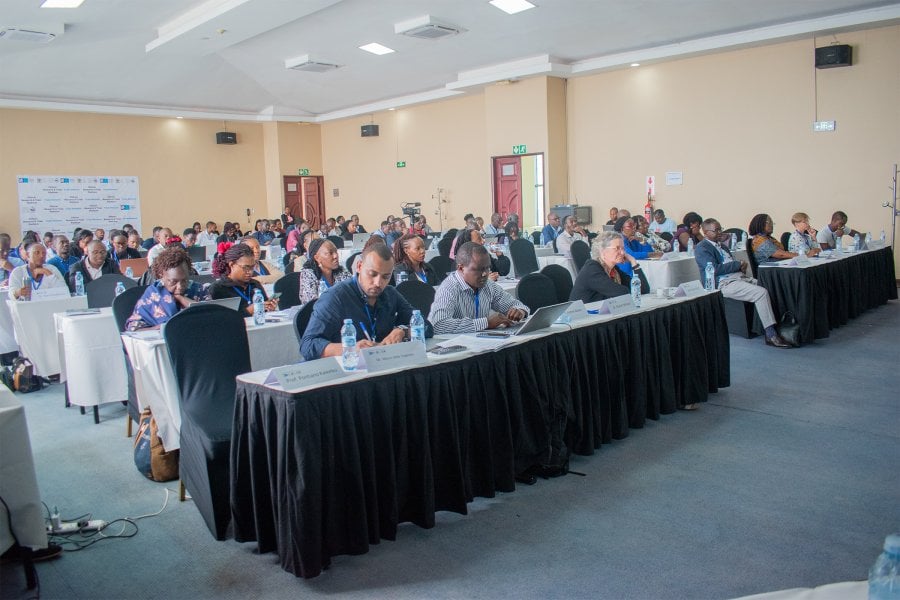
Trials Day jpeg
The MRC/UVRI and LSHTM Uganda Research Unit hosted the 2nd LSHTM Trials Day in Entebbe, Uganda on 4th November 2024. The one-day hybrid event brought together researchers from Africa and the United Kingdom to learn from global experiences in trials and reinforce a global community of good practice in trials conduct.
In his opening remarks, Professor Moffat Nyirenda, Unit Director, emphasized the significance of the event amid pressing public health concerns, such as Mpox and Marburg virus.
“This is a timely opportunity to explore how trials can address emerging health threats. We hope that the Unit will become a center of excellence for trials, not just for Uganda but for Africa as a whole,” he noted.
Professor Liam Smeeth, Director of LSHTM, added,
“Bringing expertise together is vital for the future of healthcare, as we see a growing need for more trials to address health challenges across sub-Saharan Africa.”
Towards high-impact trials
Presentations highlighted high-impact trials that address urgent global health challenges, with a focus on how trials can translate into real-world improvements. Dr Fiona Cresswell, Chief Investigator of the IMPALA trial and Honorary Scientist at the LSHTM, spoke on the importance of collaboration between research and advocacy to ensure trial outcomes have meaningful public health impacts. Other presentations included the MENISCUS trial, which demonstrated the effectiveness of student-led "action groups" in addressing menstrual health barriers, and the Daraja trial in Tanzania led by Professor Saidi Kapiga, Scientific Director at MITU, which illustrated the importance of integrating strong referral systems into HIV care to reduce patient wait times and improve health outcomes.
Targeted social and behavioral innovations
Dr. Andrew Sematta, a postdoctoral researcher and co-investigator on the Missing Billion study, shared insights from this cluster-randomized trial, showing the potential of participatory learning and action groups to improve healthcare access and reduce hospitalizations for persons with disabilities. Sheikh Omar Sillah, Senior Trials Monitor at the MRC Gambia, presented on the Measles and Rubella Vaccine Microneedle Patch (MRV-MNP) trial, a landmark study using microneedle patch technology for child and infant immunization. He emphasized the importance of adhering to standardized protocols and frequent monitoring to maintain the integrity of innovative trial designs.
Closing the community involvement gap
A key session addressed underrepresentation in clinical trials, particularly among marginalized groups such as women in UK cardiovsascular trials and African youth, among others. Presenters including Dr. Francis Kasujja, co-Project Leader on the Unit’s INTECOMM study, Professor Tim Clayton, chief investigator on the LSHTM’s BHF PROTECT-TAVI trial and Milly Mutebi, a clinical trial coordinator on the IGRA study, called for greater Patient and Public Involvement and Engagement (PPIE) in trials at all stages, including during the planning phase. Their presentations emphasized the need to refine trial methodologies to ensure inclusivity and responsiveness to diverse population needs, which remains essential for impactful trial results.
Integrating qualitative research in trials
The final session of the day explored the integration of qualitative research in clinical trials as a catalyst for innovation. Case studies from trials such as MOBILEMEN, MENISCUS, PrEPVacc and CHIEDZA illustrated the value of qualitative approaches, including rapid ethnographic assessments, in-depth interviews and focus groups. By understanding the cultural and social context in which trials are conducted, researchers can ensure that trial designs are both scientifically rigorous and culturally sensitive, making them more feasible and impactful.
About the LSHTM Trials Network
The trials network is a collaborative forum that fosters the sharing of knowledge, expertise and best practice in randomised controlled trials. The network builds skills across LSHTM and raises internal and external awareness of the excellent quality, health and equity impacts of randomised controlled trials conducted by LSHTM and its partners. The annual LSHTM Trials Day is organized by the LSHTM Trials Network Steering Committee, with funding support from the LSHTM Faculty of Epidemiology and Population Health.
If you enjoyed this article and would like to build a career in global health, we offer a range of MSc programmes covering health and data, infectious and tropical diseases, population health, and public health and policy.
Available on campus or online, including flexible study that works around your work and home life, be part of a global community at the UK's no.1 public health university.
